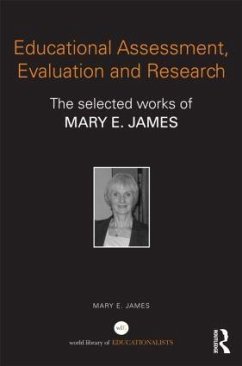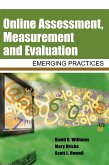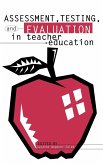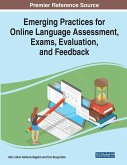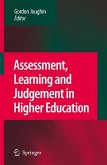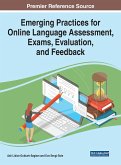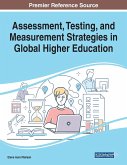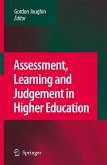- Gebundenes Buch
- Merkliste
- Auf die Merkliste
- Bewerten Bewerten
- Teilen
- Produkt teilen
- Produkterinnerung
- Produkterinnerung
First Published in 2013. Routledge is an imprint of Taylor & Francis, an informa company.
Andere Kunden interessierten sich auch für
![Online Assessment, Measurement, and Evaluation Online Assessment, Measurement, and Evaluation]() Online Assessment, Measurement, and Evaluation81,99 €
Online Assessment, Measurement, and Evaluation81,99 €![Assessment, Testing and Evaluation in Teacher Education Assessment, Testing and Evaluation in Teacher Education]() Suzanne Wegener SoledAssessment, Testing and Evaluation in Teacher Education92,99 €
Suzanne Wegener SoledAssessment, Testing and Evaluation in Teacher Education92,99 €![Emerging Practices for Online Language Assessment, Exams, Evaluation, and Feedback Emerging Practices for Online Language Assessment, Exams, Evaluation, and Feedback]() Emerging Practices for Online Language Assessment, Exams, Evaluation, and Feedback155,99 €
Emerging Practices for Online Language Assessment, Exams, Evaluation, and Feedback155,99 €![Assessment, Learning and Judgement in Higher Education Assessment, Learning and Judgement in Higher Education]() Assessment, Learning and Judgement in Higher Education115,99 €
Assessment, Learning and Judgement in Higher Education115,99 €![Emerging Practices for Online Language Assessment, Exams, Evaluation, and Feedback Emerging Practices for Online Language Assessment, Exams, Evaluation, and Feedback]() Emerging Practices for Online Language Assessment, Exams, Evaluation, and Feedback198,99 €
Emerging Practices for Online Language Assessment, Exams, Evaluation, and Feedback198,99 €![Assessment, Testing, and Measurement Strategies in Global Higher Education Assessment, Testing, and Measurement Strategies in Global Higher Education]() Assessment, Testing, and Measurement Strategies in Global Higher Education144,99 €
Assessment, Testing, and Measurement Strategies in Global Higher Education144,99 €![Assessment, Learning and Judgement in Higher Education Assessment, Learning and Judgement in Higher Education]() Assessment, Learning and Judgement in Higher Education176,99 €
Assessment, Learning and Judgement in Higher Education176,99 €-
-
-
First Published in 2013. Routledge is an imprint of Taylor & Francis, an informa company.
Produktdetails
- Produktdetails
- Verlag: Taylor & Francis
- Seitenzahl: 240
- Erscheinungstermin: 30. Mai 2013
- Englisch
- Abmessung: 236mm x 155mm x 20mm
- Gewicht: 576g
- ISBN-13: 9780415816793
- ISBN-10: 0415816793
- Artikelnr.: 39558440
- Herstellerkennzeichnung
- Libri GmbH
- Europaallee 1
- 36244 Bad Hersfeld
- gpsr@libri.de
- Verlag: Taylor & Francis
- Seitenzahl: 240
- Erscheinungstermin: 30. Mai 2013
- Englisch
- Abmessung: 236mm x 155mm x 20mm
- Gewicht: 576g
- ISBN-13: 9780415816793
- ISBN-10: 0415816793
- Artikelnr.: 39558440
- Herstellerkennzeichnung
- Libri GmbH
- Europaallee 1
- 36244 Bad Hersfeld
- gpsr@libri.de
Professor Mary E. James works part-time for the Faculty of Education, University of Cambridge as Associate Director of Research. She is also President of the British Educational Research Association.
Part One: Educational Evaluation for Innovation and Change 1. School
Self-Evaluation for the Improvement of Educational Practice: Some
theoretical issues 2. School Self-Evaluation: Patterns of emerging practice
3. HOw Shal we Know Success: Alternative ways of developing criteria for
judging the effectiveness of educational programmes, with reference to PSHE
4. Evaluation for Policy: Rhetoric and political reality Part 2:
Educational Assessment and Learning 5. Negotiation and Dialogue in Student
Assessment by Teachers 6. Assessment for Learning 7. Assessment, Learning
and the Improvement of Students 8. Systems for Moderation by Teachers to
Enhance the Quality of Assessment 9. Measured Lives: The rise of assessment
as the engine of change in English schools 10. Assessment in Harmony with
our Understanding of Learning Part Three: Educational Research and the
Development of Curriculum and Pedagogy 11. Embedding and Spreading
Assessment for Learning and Learning How to Learn Ideas and Practices
Within and Beyond the Classroom 12. Ten Principles for Effective Pedagogy
13. Lawrence Stenhouse's Process Model of Curriculum Research and
Development Revisited
Self-Evaluation for the Improvement of Educational Practice: Some
theoretical issues 2. School Self-Evaluation: Patterns of emerging practice
3. HOw Shal we Know Success: Alternative ways of developing criteria for
judging the effectiveness of educational programmes, with reference to PSHE
4. Evaluation for Policy: Rhetoric and political reality Part 2:
Educational Assessment and Learning 5. Negotiation and Dialogue in Student
Assessment by Teachers 6. Assessment for Learning 7. Assessment, Learning
and the Improvement of Students 8. Systems for Moderation by Teachers to
Enhance the Quality of Assessment 9. Measured Lives: The rise of assessment
as the engine of change in English schools 10. Assessment in Harmony with
our Understanding of Learning Part Three: Educational Research and the
Development of Curriculum and Pedagogy 11. Embedding and Spreading
Assessment for Learning and Learning How to Learn Ideas and Practices
Within and Beyond the Classroom 12. Ten Principles for Effective Pedagogy
13. Lawrence Stenhouse's Process Model of Curriculum Research and
Development Revisited
Part One: Educational Evaluation for Innovation and Change 1. School
Self-Evaluation for the Improvement of Educational Practice: Some
theoretical issues 2. School Self-Evaluation: Patterns of emerging practice
3. HOw Shal we Know Success: Alternative ways of developing criteria for
judging the effectiveness of educational programmes, with reference to PSHE
4. Evaluation for Policy: Rhetoric and political reality Part 2:
Educational Assessment and Learning 5. Negotiation and Dialogue in Student
Assessment by Teachers 6. Assessment for Learning 7. Assessment, Learning
and the Improvement of Students 8. Systems for Moderation by Teachers to
Enhance the Quality of Assessment 9. Measured Lives: The rise of assessment
as the engine of change in English schools 10. Assessment in Harmony with
our Understanding of Learning Part Three: Educational Research and the
Development of Curriculum and Pedagogy 11. Embedding and Spreading
Assessment for Learning and Learning How to Learn Ideas and Practices
Within and Beyond the Classroom 12. Ten Principles for Effective Pedagogy
13. Lawrence Stenhouse's Process Model of Curriculum Research and
Development Revisited
Self-Evaluation for the Improvement of Educational Practice: Some
theoretical issues 2. School Self-Evaluation: Patterns of emerging practice
3. HOw Shal we Know Success: Alternative ways of developing criteria for
judging the effectiveness of educational programmes, with reference to PSHE
4. Evaluation for Policy: Rhetoric and political reality Part 2:
Educational Assessment and Learning 5. Negotiation and Dialogue in Student
Assessment by Teachers 6. Assessment for Learning 7. Assessment, Learning
and the Improvement of Students 8. Systems for Moderation by Teachers to
Enhance the Quality of Assessment 9. Measured Lives: The rise of assessment
as the engine of change in English schools 10. Assessment in Harmony with
our Understanding of Learning Part Three: Educational Research and the
Development of Curriculum and Pedagogy 11. Embedding and Spreading
Assessment for Learning and Learning How to Learn Ideas and Practices
Within and Beyond the Classroom 12. Ten Principles for Effective Pedagogy
13. Lawrence Stenhouse's Process Model of Curriculum Research and
Development Revisited

